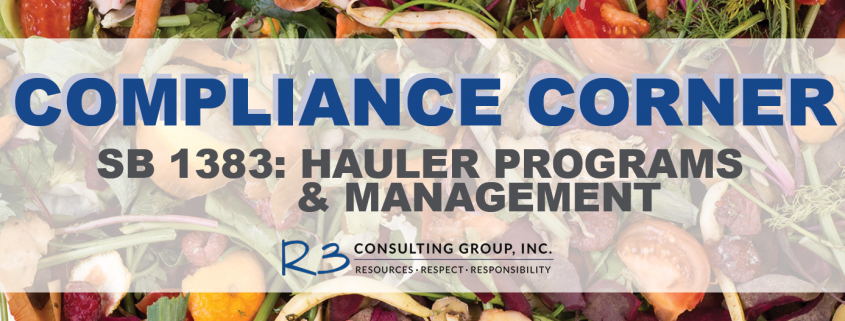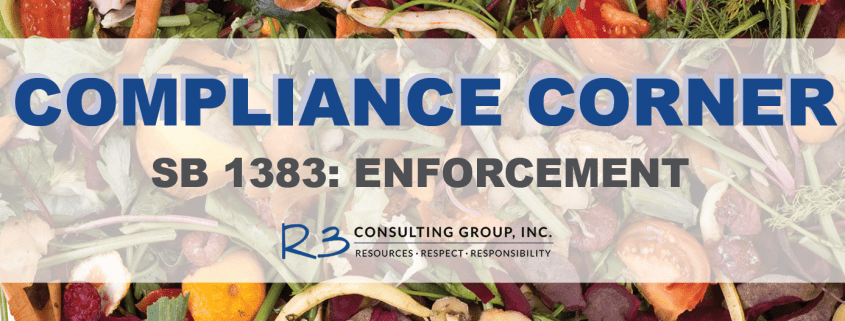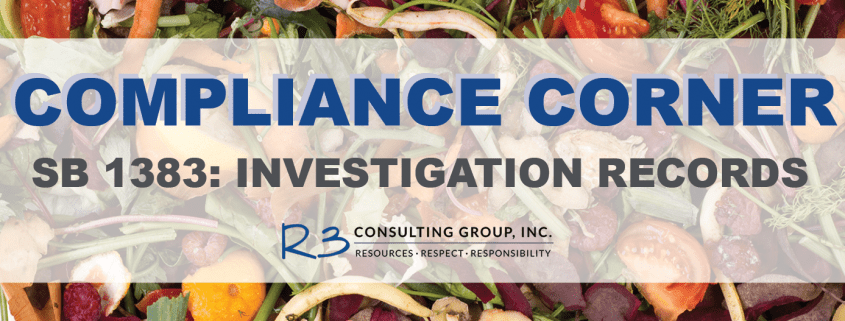While our efforts towards SB 1383 implementation and sustainment will carry on for the foreseeable future, we’re sad to say that our yearlong dedication to SB 1383-related blog posts is coming to an end.
We’ve covered topics ranging from Education & Outreach to Route Reviews & Enforcement, and everything in between. As we close out the year, we are giving you one last post covering information all about Hauler Programs / Management of Haulers.
Ultimately, jurisdictions are the ones responsible for the implementation and maintenance of SB 1383 requirements, however, these goals can only be achieved by working in partnership with the haulers. Franchise agreements have been, and will continue to be, drafted or amended to include SB 1383 language, including specific hauler proposed programs and measures of compliance to ensure that progress is made in the advancement and application of those programs.
Hauler Programs
Whether through sole-sourced negotiations, or through Request for Proposals (RFP) process, jurisdictions are including SB 1383 provisions in the form of a Sustainability and Compliance Plan (nomenclature may vary by agreement) and specific hauler required programs.
The hauler’s proposed plan must describe:
- How the hauler will provide outreach and education to residents, schools and businesses.
- The material that will be developed and distributed, including its format and distribution method
- How the hauler will maintain compliance with the State’s Mandatory Commercial and Organics Recycling mandates (SB 1383, AB 1826, AB 939, AB 341), including when and to whom letters will be sent, how compliance will be documented and reported.
- The hauler’s plan for waste audits, route audits, meeting cart color and labeling requirements, and site visits.
The plan also requires the hauler to document and report implementation of each of the plan’s components and other compliance data in an online waste reporting system or another format as designated by the jurisdiction.
Management of Haulers
Hauler programs are incorporated into respective franchise agreements to list specific actions that the hauler will take to assist the jurisdiction that they serve in achieving the requirements of SB 1383. You may ask yourself how jurisdictions are ensuring that haulers are applying the practices described in their proposed plans and franchise agreements.
There are several ways in which jurisdictions are ensuring that SB 1383 related hauler programs are being implemented, such as:
- Requirement of Staffing
- Haulers are required to add a dedicated full-time Sustainability/Compliance Representative, whose responsibilities include conducting site visits and providing outreach and education in support of meeting Franchised and CalRecycle Diversion requirements and to meet State mandates, and all amendments and related subsequent legislation.
- Submission of a Sustainability and Compliance Plan
- This plan can carry a different name, but essentially details the hauler’s plan of action to assist the jurisdiction in which it serves, in all the areas listed under the “Hauler Programs” section above.
- Regular Reporting
- Jurisdictions can monitor and/or manage hauler progress through required reports that are provided monthly, quarterly, and/or annually (or some combination of the three). Some jurisdictions have begun to include a reporting line item requiring the hauler to list efforts made towards, and measured impact from, the reduction of Greenhouse Gas (GHG) emissions.
- Right-Sizing of Containers
- In an attempt to further increase diversion efforts, haulers are required to proactively assist multi-family and commercial customers in the rightsizing of containers, which includes an evaluation of material generation and increase/decrease of container size and/or frequency of collection.
- Administrative Charges
- If a hauler fails to perform to the agreed upon standards of the franchise agreement in which it operates, jurisdictions have the ability to assess administrative charges to force correction of an identified issue




